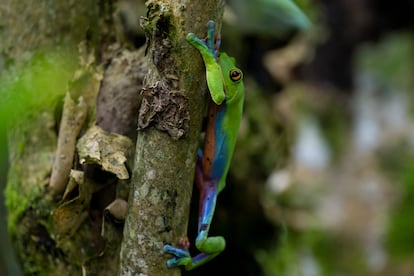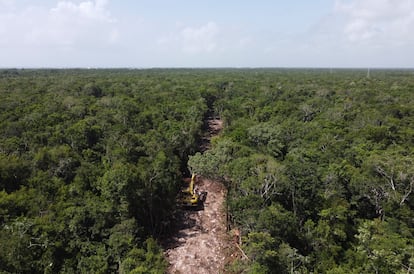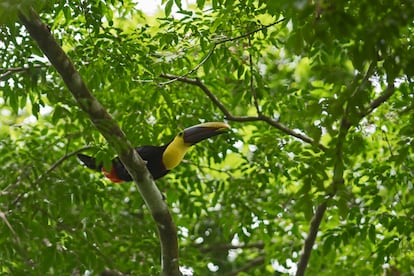An SOS for Mesoamerica’s rainforests
Five ecosystems, from the Mayan jungle in Mexico to the Darién in Panama, are key links in an intercontinental biological chain


Being the Amazon’s little brother has its drawbacks. Often touted as the lungs of the world, the enormous Amazon jungle gets all the attention. But there are five large Latin American rainforests that are key to the survival of thousands of species: the Maya Forest (Mexico, Belize and Guatemala); the Moskitia (Nicaragua and Honduras); the Indio Maíz-Tortuguero (Nicaragua and Costa Rica); La Amistad (Costa Rica and Panama); and the Darién, between Panama and Colombia. These five Mesoamerican ecosystems are key links in an intercontinental biological chain.
Comprising less than 5% of the planet’s area, these ecosystems host an estimated 8% of the world’s biodiversity. With 210 million acres (85 million hectares) of forest, they provide a crucial corridor for species traveling between the American continents. This is why Oscar Núñez, director of the Wildlife Conservation Society’s (WCS) Five Forests project, says these ecosystems must be saved at all cost. “We need to intervene before they are destroyed,” he said in his presentation at the 2023 Latin American and Caribbean Climate Week (LACCW) conference in Panama City.
Núñez is concerned for several reasons. The five Mesoamerican giants, like the Amazon and other forests in the region, are severely threatened by the rapid spread of livestock ranches. The WCS estimates that 90% of the area’s deforestation is caused by illegal ranching. Núñez also says the current El Niño phenomenon might be as destructive as the one in 1997 and 1998.

There are parallels between the two time periods, like the dramatic large wildfires in Greece, Canada, Indonesia, Central America and Hawaii. WCS has data to reinforce empirical observations. In the five major Mesoamerican forests, rainfall has significantly decreased by nearly 23%. “We are in a rainfall deficit,” said Núñez, who urges governments and international organizations to sound the alarms and pay attention to the forests everyone else is ignoring.
“The five great forests of Mesoamerica — they compete (in a good way) with the Congo and the Amazon when it comes to resources,” said Núñez. “But they are crucial not just for the interconnection of species, but also for the Indigenous peoples who live in and take care of these forests.” Some have already suffered major damage: in the last 15 years, the Maya Forest has lost an estimated 25% of its trees; the Moskitia has lost 30%; and the Indio Maíz has lost 23%.

Núñez is not yet sure whether the Darién, the largest preserve in Central America and the Caribbean (1.43 million acres or 579,000 hectares), will be affected by the growing influx of migrants traveling through the area. “The important thing is that the migrants don’t start crossing other parts of the Darién, because right now they just go through a small piece of the tail,” he said.
The WCS and other conservation organizations like ReWild and Mesoamerican Alliance of Peoples and Forests (CIAT) are now publicizing the crisis facing the Mesoamerican forests and reclaiming what can still be saved. Their goals include protecting 25 million acres (10 million hectares) of forest and restoring another 1.2 million acres. They are also combatting species extinction and illegal livestock ranches, which is the most challenging battle. Ultimately, the goal is to draw attention to these often overlooked forests, shining a light on their significance and value.
Sign up for our weekly newsletter to get more English-language news coverage from EL PAÍS USA Edition
Tu suscripción se está usando en otro dispositivo
¿Quieres añadir otro usuario a tu suscripción?
Si continúas leyendo en este dispositivo, no se podrá leer en el otro.
FlechaTu suscripción se está usando en otro dispositivo y solo puedes acceder a EL PAÍS desde un dispositivo a la vez.
Si quieres compartir tu cuenta, cambia tu suscripción a la modalidad Premium, así podrás añadir otro usuario. Cada uno accederá con su propia cuenta de email, lo que os permitirá personalizar vuestra experiencia en EL PAÍS.
¿Tienes una suscripción de empresa? Accede aquí para contratar más cuentas.
En el caso de no saber quién está usando tu cuenta, te recomendamos cambiar tu contraseña aquí.
Si decides continuar compartiendo tu cuenta, este mensaje se mostrará en tu dispositivo y en el de la otra persona que está usando tu cuenta de forma indefinida, afectando a tu experiencia de lectura. Puedes consultar aquí los términos y condiciones de la suscripción digital.








































